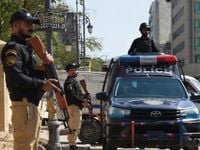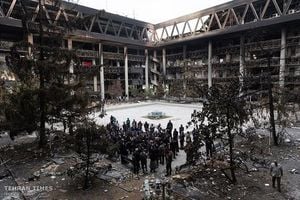On Monday, September 22, 2025, a devastating explosion tore through a compound in the Matur Dara area of Tirah Valley, nestled in the Khyber district of northwest Pakistan’s Khyber Pakhtunkhwa province. The blast, which local police say resulted from bomb-making materials allegedly stored by Pakistani Taliban fighters, killed at least 24 people and injured several others. Among the dead were 14 militants and at least 10 civilians, including women and children, according to multiple reports from Devdiscourse, The Telegraph Online, and the Associated Press.
The explosion, which destroyed several nearby homes, has sent shockwaves through the already restive region bordering Afghanistan. The area has long been a hotbed of militant activity, and this latest tragedy underscores the persistent dangers faced by civilians living in the shadow of conflict.
Station House Officer Zafar Khan of Tirah Police Station told The Telegraph Online, “At least 10 civilians, including women and children, were killed, along with 14 militants in the explosion.” His account was echoed by other officials who confirmed the high civilian toll and described the extent of the destruction in the valley.
Rumors swirled in the immediate aftermath of the blast, with some local residents insisting that the compound had been targeted by Pakistani fighter jets. However, authorities were quick to dispel these claims, clarifying that the explosion was accidental and triggered by the detonation of explosives stored for bomb-making. As Devdiscourse reported, local administration officials stated, “The blast was due to explosives intended for bomb-making, countering rumors about aerial bombardments by Pakistani jets.”
The compound in question was no ordinary residence. It had reportedly served as a base for both local militants and Afghan fighters, and was widely regarded as a hub for the production of improvised explosive devices (IEDs) and sniper training. According to The Telegraph Online, “The compound had been home to a large number of local militant leaders and operatives, including dozens of Afghan fighters. It was regarded as a hub for the production of improvised explosive devices (IEDs) and sniper training.”
Police and security officials allege that the militants operating in the area, including two local Pakistani Taliban commanders named Aman Gul and Masood Khan, had established hideouts in the compound. The facility was being used as a factory for producing roadside bombs, and militants were accused of using civilians as human shields. Officer Zafar Khan told the Associated Press, “They had recently stored weapons in mosques in other districts.”
The practice of embedding explosives and militant infrastructure within civilian areas is not new, but it has proven deadly time and again. By storing large quantities of bomb-making materials in compounds surrounded by homes, militants not only seek to restrict access for security forces but also endanger the lives of innocent families. As Devdiscourse noted, “Accumulating explosives within civilian vicinities has posed severe risks, often leading to unintentional detonations.”
Monday’s tragedy is just the latest in a string of violent incidents that have plagued northwest Pakistan in recent years. Since the Taliban’s return to power in Kabul in 2021, Pakistan has witnessed a marked surge in militant violence, much of it claimed by the Pakistani Taliban, also known as Tehrik-e-Taliban Pakistan (TTP). The TTP, while a separate entity, is closely allied with the Afghan Taliban. Their resurgence has dashed Islamabad’s hopes that a friendly government in Afghanistan would help contain terrorism along the porous border.
The Associated Press reported, “Pakistan has seen a surge in militant attacks, most claimed by the Pakistani Taliban, known as Tehrik-e-Taliban Pakistan or TTP, who are allied with the Afghan Taliban. The TTP is a separate group but has been emboldened since the Afghan Taliban’s return to power in 2021. Many TTP leaders and fighters are believed to have found sanctuary in Afghanistan.”
Security forces in Pakistan have responded with a series of operations targeting militant hideouts in Khyber, Bajaur, and other parts of the northwest. Despite these efforts, the frequency and intensity of attacks have only increased, leaving both security personnel and civilians at risk. The use of civilian areas as cover by militants complicates counterterrorism operations and often leads to tragic collateral damage, as seen in Monday’s explosion.
Some residents remain skeptical of the official narrative, maintaining that the compound was targeted by an airstrike rather than falling victim to an accidental detonation. This suspicion reflects the deep mistrust that has taken root in communities caught between militant groups and state security forces. However, multiple sources, including Devdiscourse and The Telegraph Online, have reported that local authorities firmly deny any involvement of Pakistani jets, emphasizing that the fatalities resulted from the mishandling of explosives by the militants themselves.
Pakistan’s northwest has a long and troubled history with militancy, and the challenges facing the region are as much political as they are military. The border with Afghanistan is notoriously difficult to police, and the flow of fighters and weapons across it remains a persistent problem. The TTP, emboldened by developments in Afghanistan, continues to exploit the region’s rugged terrain and local grievances to maintain its foothold.
For families living in places like Tirah Valley, life is marked by uncertainty and fear. The destruction of several homes in Monday’s blast has left many without shelter, compounding the tragedy for survivors. Humanitarian needs in the region are likely to grow as violence continues and civilian infrastructure is repeatedly caught in the crossfire.
As the dust settles over Matur Dara, the broader implications of the explosion are clear. The incident highlights the grave risks posed by the militarization of civilian spaces and the ongoing instability along the Pakistan-Afghanistan border. It also serves as a grim reminder that, for many in northwest Pakistan, peace remains elusive, and the cost of conflict is measured in innocent lives lost.
While security forces press on with their operations and politicians debate the best path forward, the people of Tirah Valley are left to mourn their dead and rebuild what little remains. Monday’s explosion stands as a stark warning of the dangers that persist in the region—and the urgent need for solutions that prioritize both security and the protection of civilians.





